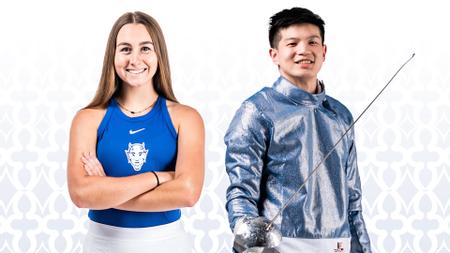DS: It’s interesting because it feels like sports science and sports psychology, you said you dealt with it a little bit in high school, but it feels like it’s a relatively new field in the grand scheme of things. How does that interface for you, particularly when you think about tennis. I know there’s doubles, and you’re a part of a team here at Duke, but in many ways it’s a very individual sport. It’s kind of you and your thoughts while you’re out there playing. How do you approach that side of it?
CB: Yeah, that’s something that is huge for me. I would say I honestly value the mental side of tennis more. If I had to rank the mental and physical side, I would probably rank the mental side higher because I think that that is what’s given me the edge in college. I’ve worked with sports psychologists since I’ve been at Duke, like I did in high school. All of the behavioral health and sports psychologists in Duke Athletics have really helped me with figuring out how to manage my nerves, not push them away, and deal with the stress of academics and social life and everything when you’re walking onto the court, and you have to only think about tennis.
It’s been really good to learn more about how my own brain works and how the brain works in general. I think that’s helped me win the really tough matches and, you know, stay on the court at 10:30 p.m. and still finish playing tennis when I’d much rather probably be asleep.
DS: I don’t want you to give away all of your secrets, but now I’m curious. Take me through what the internal dialogue is like when you’ve got a third set coming up or you’re an hour into a match. Do you give yourself pep talks or what’s going through your mind when you’re in those moments?
CB: The one thing that I realized about myself is the more I actually think about myself and what I’m doing, the worse off I am. Two things that I always come back to when I’m in those really long matches or really tight moments that can cause you to be overwhelmed are just trying to remind myself of what’s actually going on and where I’m at. If it’s a dual match, I’m looking around at my teammates trying to direct my attention outward. For example, I might tell myself, “Let’s cheer for Ellie right now” or “Let’s go look at my grandparents who are up in the stands and think about how lucky I am to have them here.”
The other thing I like to do is just get a lot of my energy…
Click Here to Read the Full Original Article at Duke University…

